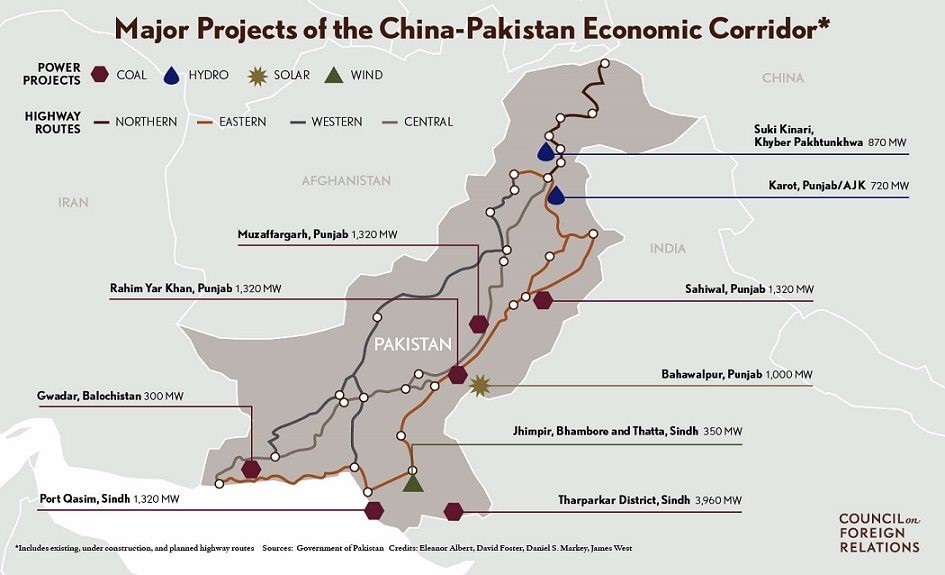

- China has rejected accusations that its financial backing for the China Pakistan Economic Corridor (CPEC) was a “debt trap” that could compromise Islamabad’s sovereignty.
- China maintains it provides no-str
Issue
- China has rejected accusations that its financial backing for the China Pakistan Economic Corridor (CPEC) was a “debt trap” that could compromise Islamabad’s sovereignty.
- China maintains it provides no-string attached backing to CPEC, which is the key to its ‘One belt, one route’ initiative.
Background
- China-Pak Relations:Pakistan was one of the first countries to establish diplomatic relations with the People’s Republic of China (PRC), even when the U.S.-Pakistan relationship was strong. They define their present friendship as “higher than the mountains, deeper than the oceans and sweeter than honey”.
- CPEC is a politically charged $46 billion economic project that aims at bolstering Pakistan’s economy by constructing special economic zones including 3,218-kilometer long route consisting of highways, railways and pipelines. It runs through Baluchistan province and GilgitBaltistan. It also passes through Pakistan occupied Kashmir, to which India has expressed strong opposition.
a. Among the 22 projects within the framework of CPEC, 18 of them are directly invested or offered aid by the Chinese side, and only four of them used China’s concessional loan.
b. $19 billion had been invested in the CPEC, which had generated 70,000 new jobs. Through it, Pakistan’s growth rate is expected to be pushed by 1% or 2%. - Debt trap diplomacy: Through its $1 trillion “One Belt, One Road” initiative, China is supporting infrastructure projects in strategically located developing countries, often by extending huge loans to their governments. As a result, countries are becoming ambushed in a debt trap that leaves them vulnerable to China’s influence. It can be considered as China’s neo-colonial design of hegemony.
Analysis
- Over the years, China has mastered the use of economic tools to advance its country’s geostrategic agenda. It has undertaken similar economic model in Africa and many Asian countries such as Maldives, Sri Lanka, and Malaysia.
- In economic sense, extending loans for infrastructure projects is not inherently wrong, but the way China is using it to encroach on countries’ sovereignty is. Projects supported by China are often intended not to support the local economy, but to facilitate Chinese access to natural resources, or to open the market for low-cost and shoddy Chinese goods.
- Similarly, the current Chinese development model in Pakistan has little to do for the local economy. China prefers to use its own companies and employees rather than hire locally. For all the China-funded projects in Pakistan, China determines the contracts, thereby burdening Pakistan with a high interest loan. Trade provisions are also unfairly tilted towards Chinese companies and many Pakistani businessmen worry of being wiped out by this unfair competition.
- Some developing economies are regretting their decision of accepting Chinese loans. Burdened by their debts to China, many are being forced to sell to it stakes in Chinese-financed projects or hand over their management to Chinese state-owned firms.
- New governments in several countries, from Nigeria to Sri Lanka, have ordered investigations into alleged Chinese bribery of the previous leadership.
Indian concerns
- For its 70 years history, Pakistan has heavily relied on foreign aid from international monetary agencies, however, CPEC as an economic project, has become worrisome as the debts it causes, may crash Pakistan’s financial system, consequently reducing it to be a ‘vassal state’. This will most definitely create national security threats for India.
- Currently, Pakistan and China are in primary alliance at strategic, economic, military and political level. India remains their focus country. The more dependent Pakistan become on China, more difficult it will be to have a bilateral agreement between India and Pakistan without Chinese influence.
Learning Aid
Practice Question
By integrating its foreign, economic, and security policies, China is advancing its goal of fashioning a hegemonic sphere of trade, communication, transportation, and security links in Asia and Africa. Examine.


